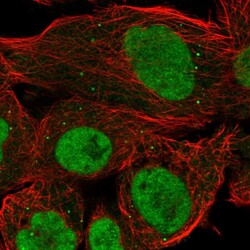Antibody data
- Antibody Data
- Antigen structure
- References [1]
- Comments [0]
- Validations
- Immunocytochemistry [1]
- Chromatin Immunoprecipitation [1]
Submit
Validation data
Reference
Comment
Report error
- Product number
- HPA026997 - Provider product page

- Provider
- Atlas Antibodies
- Proper citation
- Atlas Antibodies Cat#HPA026997, RRID:AB_1855681
- Product name
- Anti-PRDM10
- Antibody type
- Polyclonal
- Description
- Polyclonal Antibody against Human PRDM10, Gene description: PR domain containing 10, Alternative Gene Names: KIAA1231, MGC131802, PFM7, Validated applications: WB, ChIP, ICC, IHC, Uniprot ID: Q9NQV6, Storage: Store at +4°C for short term storage. Long time storage is recommended at -20°C.
- Reactivity
- Human
- Host
- Rabbit
- Conjugate
- Unconjugated
- Isotype
- IgG
- Vial size
- 100 µl
- Concentration
- 0.05 mg/ml
- Storage
- Store at +4°C for short term storage. Long time storage is recommended at -20°C.
- Handling
- The antibody solution should be gently mixed before use.
Submitted references PRDM10 directs FLCN expression in a novel disorder overlapping with Birt-Hogg-Dubé syndrome and familial lipomatosis.
van de Beek I, Glykofridis IE, Oosterwijk JC, van den Akker PC, Diercks GFH, Bolling MC, Waisfisz Q, Mensenkamp AR, Balk JA, Zwart R, Postma AV, Meijers-Heijboer HEJ, van Moorselaar RJA, Wolthuis RMF, Houweling AC
Human molecular genetics 2023 Mar 20;32(7):1223-1235
Human molecular genetics 2023 Mar 20;32(7):1223-1235
No comments: Submit comment
Supportive validation
- Submitted by
- Atlas Antibodies (provider)
- Main image

- Experimental details
- Immunofluorescent staining of human cell line A-431 shows localization to nucleoplasm, nucleoli fibrillar center & vesicles.
- Sample type
- Human
Supportive validation
- Submitted by
- Atlas Antibodies (provider)
- Main image

- Experimental details
- ChIP-Exo-Seq composite graph for Anti-PRDM10 (HPA026997, Lot A118805) tested in K562 cells. Strand-specific reads (blue: forward, red: reverse) and IgG controls (black: forward, grey: reverse) are plotted against the distance from a composite set of reference binding sites. The antibody exhibits robust target enrichment compared to a non-specific IgG control and precisely reveals its structural organization around the binding site. Data generated by Prof. B. F. Pugh´s Lab at Cornell University.
 Explore
Explore Validate
Validate Learn
Learn Western blot
Western blot Immunocytochemistry
Immunocytochemistry